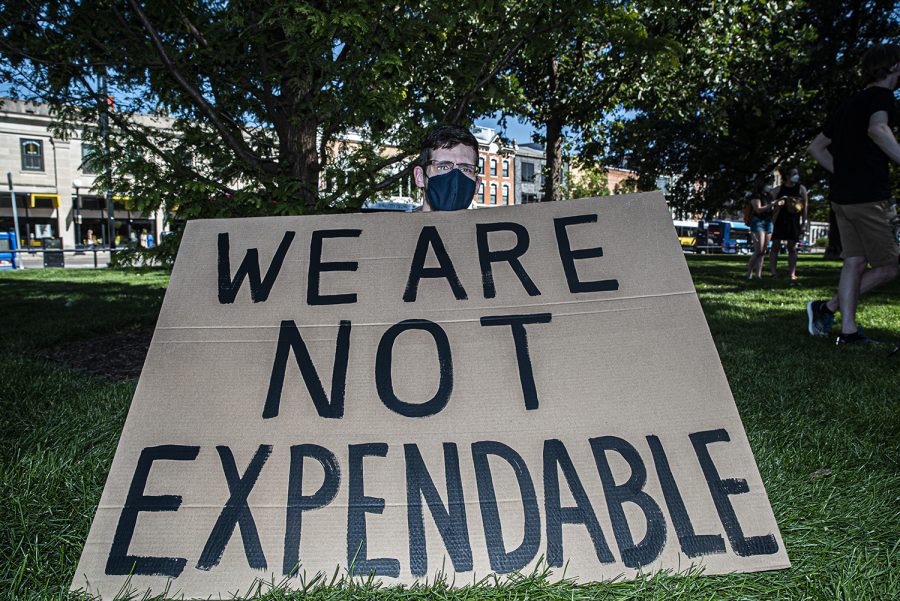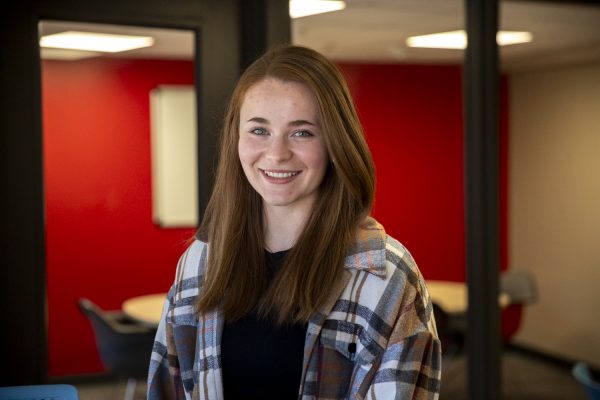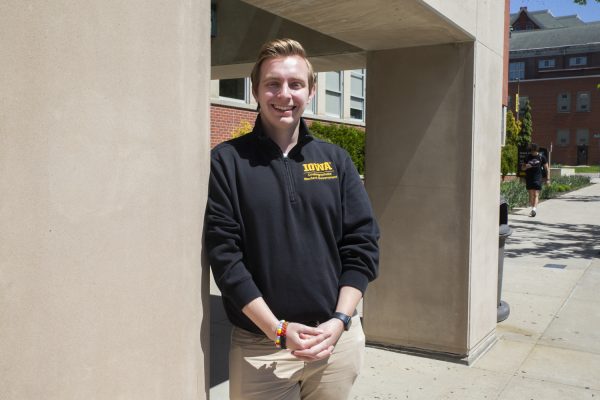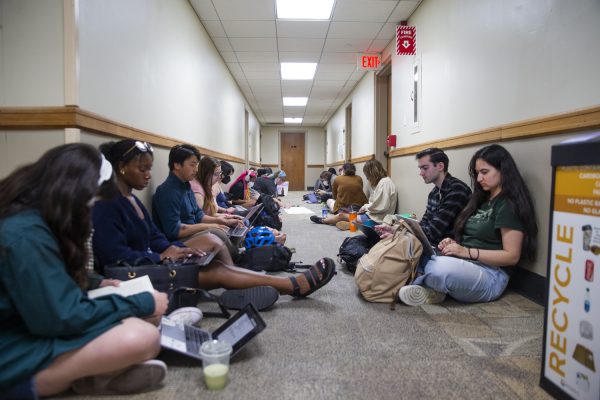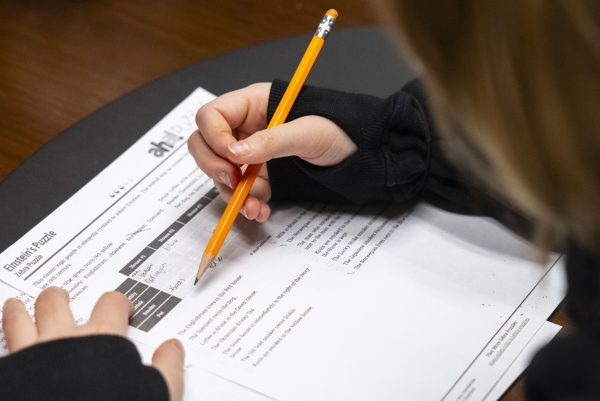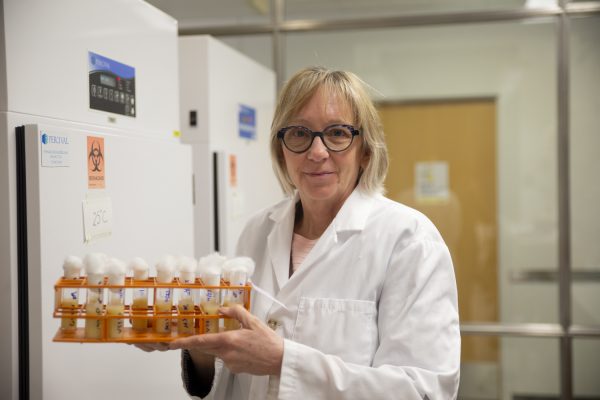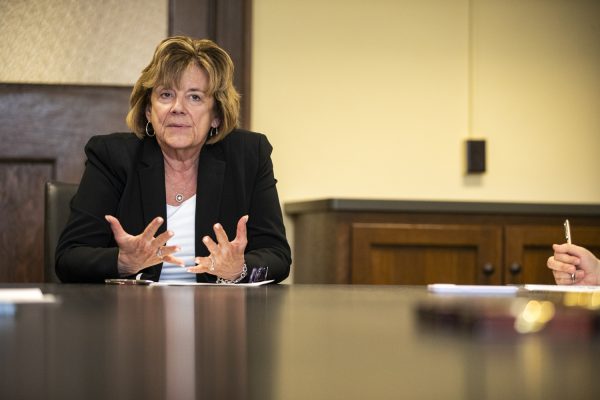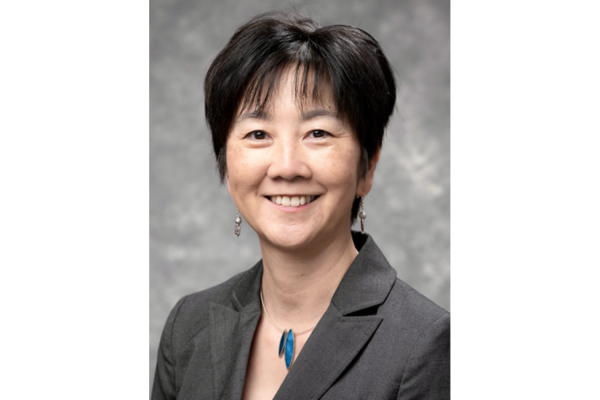COGS, state Board of Regents differ on wage increases as contract negotiations begin
The Campaign to Organize Graduate Students met virtually with the state Board of Regents on Tuesday, where the two groups discussed different proposals for the union’s two-year contract.
University of Iowa graduate student Drew Etienne poses for a portrait in downtown Iowa City on Wednesday, Aug. 19, 2020. The Campaign to Organize Graduate Students (COGS) led a march to President Bruce Harreld’s home in order to protest the administration’s insistence that the university remain open despite the health risk posed by COVID-19.
February 9, 2021
The University of Iowa’s Campaign to Organize Graduate Students and the state Board of Regents shared their initial contract proposals on Tuesday, formally beginning the collective bargaining process.
COGS asked for a 5 percent raise per year in their proposal during the virtual meeting on Tuesday afternoon. The regents countered with a 1 percent raise offer. The proposals stand as a point to begin bargaining conversations that will take place in closed meetings in coming weeks.
COGS President and Ph.D. Candidate in the UI’s Department of History John Jepsen said the union also proposed a 5 percent wage increase in its last contract negotiations with the regents in 2019.
Jepsen said the proposal is also asking for some language concerning non-wage topics such as paid leave and other benefits taken off the table because of a 2017 law to be added back.
“Two years ago, I sat across this table from the regents as a member of the COGS team and two years ago we proposed the same thing at the beginning of contract negotiations, namely a full restoration of all permissive items to our contract,” Jepsen said. “…The circumstances that led us to propose 5 percent previously have not changed for the better. In fact, they’ve deteriorated.”
The union’s proposal also focused on paid leave for graduate employees who are also parents and substitute teaching pay.
Regents Chief Negotiator Michael Galloway said the regents’ proposal does not include any of the language included in the COGS proposal because of the wording not being a requirement of the law – something he also said at the UI’s Hospitals and Clinics’ union’s bargaining session.
“We are proposing a 1 percent wage increase to the various wage provisions within the contract,” Galloway said. “There is no proposal from the regents to include or add back in any language, but that will be a discussion that will be a proper subject for closed door negotiations.”
He did not encourage COGS representatives to take up issues dealing with paid leave, substitute pay, or other content that used to be in the union’s contracts.
COGS member Ashley Dorn, who is a teaching assistant at the UI, said the union and graduate employees were left out of COVID-19 planning and the current plans for selecting the next president of the university. The 21-member search committee tasked with selecting finalists for the next head Hawkeye includes the president of Graduate and Professional Student Government, Mackensie Graham, and John Piegors, the president of the Graduate Student Senate and is also listed as a representative of UE Local 896 COGS, the union that represents graduate student workers. Piegors is not a in a COGS leadership role.
Since graduate students are the ones teaching most in-person classes during the 2020-21 academic year, Dorn said their voices are integral.
“The exclusion of COGS, the legal representative of all graduate workers, pertaining to the COVID-19 pandemic response and from the presidential hiring search is a troubling erosion of democracy on campus and an underestimation of graduate labor,” Dorn said. “…Graduate students shoulder substantial teaching, research, and writing responsibilities that they do not receive adequate compensation for.”
Josh Lehman, spokesperson for the state Board of Regents told the DI in an email that Piegors is a member of COGS, and was endorsed by COGS leadership to be their representative, which COGS leadership say happened after the committee was announced.
“The search committee co-chairs engaged with the UI Graduate and Professional Student Government, as well as the Graduate Student Senate, as part of reaching out to shared governance groups and other constituents for representation on the presidential search committee,” Lehman wrote in an email to the DI. “GPSG and GSS selected representatives from their organizations to serve on the search committee. The GSS member, John Piegors, belongs to COGS and has been endorsed by COGS leadership to be their representative.”
Elizabeth Handschy, a COGS spokesperson said the union voted for John Piegors, a COGS member, to be their representative only after the union reached out to the committee post-announcement to request a seat on the search committee. Handschy told the DI in an email that COGS leadership were told the request for a seat couldn’t be fulfilled because the search was already underway.
During the presentation, two other COGS representatives said the pandemic has not only created concerns about instructors’ safety, but it also created extra costs because of the need for a strong internet connection when teaching from home.
Ph.D. student and teaching assistant at the UI Igna Popovaite said the pandemic has also been incredibly difficult on international graduate workers who cannot work outside of the university to supplement their income due to their immigration status.
“[The] global pandemic, shut international borders, [and] ever changing immigration rules were just a few challenges faced by me and other international graduate workers on top of everyday daily uncertainty experienced by everyone else on campus,” she said. “…We are also not eligible for any federal coronavirus relief repayments, despite being taxpayers like everyone else.”
The regents and COGS will continue discussion in closed meetings soon, Galloway said. The regents are currently in contract negotiations with UIHC, COGS, and the University of Northern Iowa’s United Faculty.
Neither party laid out a definitive timeline for future virtual meetings.



